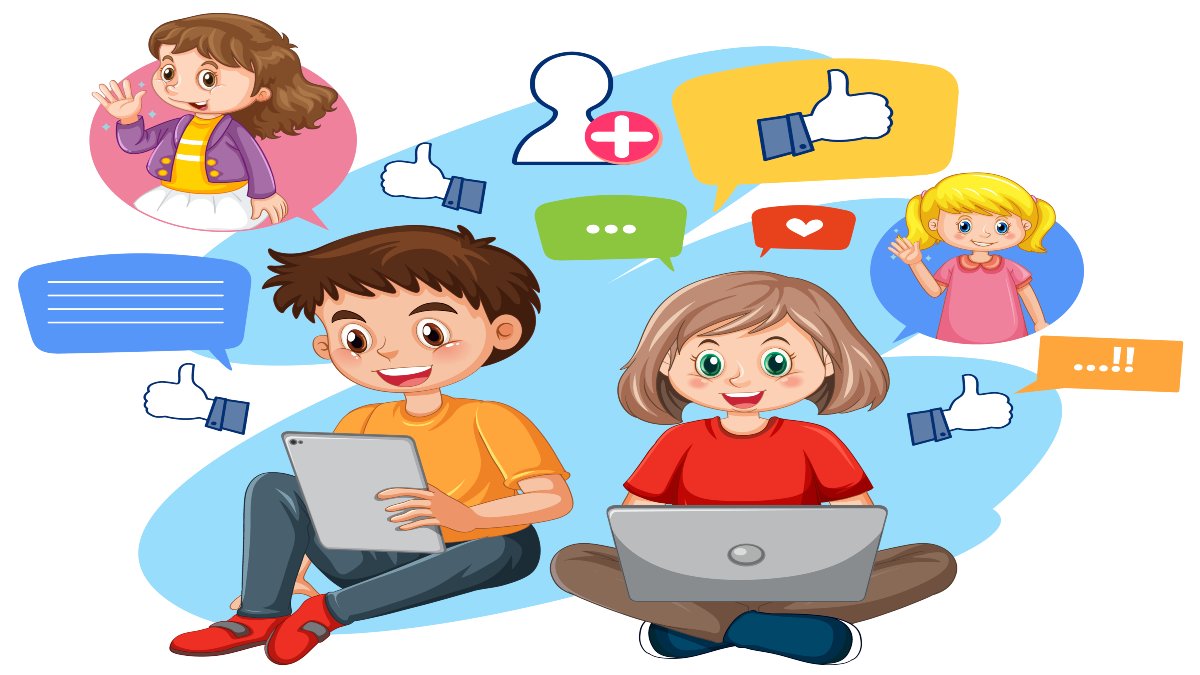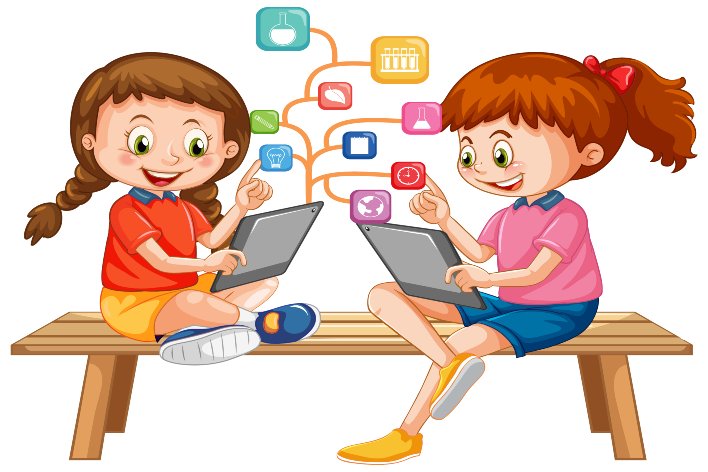Digital Literacy for Kids: The Key in Navigating the Digital Age

Living in a time when technology is at the center of everything we do, digital literacy has become one of the key competencies children need. Being informed about what is digital literacy, how it influences education, and why it is essential for being safe online will serve to bring up responsible, tech-savvy individuals. Let's delve into why digital literacy for kids matters and sets the pathway to their future success.
What is Digital Literacy?
Let us look into the meaning of digital Literacy. It involves much more than proficiency with either the computer or smartphone. In more specific language, it is the skills of finding, evaluating, creating, and communicating information using digital technologies. It means using technologies effectively, securely, and responsibly. This means that for children, this will involve the specifics of how to locate and validate material online, learning about safety on the internet, and developing the competence to communicate digitally with clarity and respect.
Importance of Digital Literacy for Kids

With increased digitalization and integration of technologies into every other aspect of life, the skill of digital literacy is fast becoming a crucial competency for kids worldwide. Children should understand the use of digital tools extending to creation, collaboration, and innovation beyond mere content consumption. Reasons why digital literacy is important for kids include:
1. Furtherance of Education
Digital literacy plays a key role in education in the modern classroom. With the integration of technology into the school curriculum, through online assignments and projects or virtual learning, children must be digitally literate to navigate these effectively. It would, therefore, improve their learning experiences, as well as prepare them more suitably for higher educational and professional pursuits where electronic interactions will always be indispensable.
2. Critical Thinking and Problem-Solving
One of the biggest benefits of digital literacy is that it cultivates critical thinking. Children learn to sift through thousands of pieces of information on the internet and can distinguish what to believe and what not. Critical evaluation thus lets them cognize some real problem-solving skills, which in turn would affect their ability to make informed decisions.
3. Future Career Opportunities
Living in today's world, digital literacy is one of the great aspirations of a career. As kids grow older, entering into industries that rely increasingly on technology, in effect, when kids learn early in life about digital literacy, they add to themselves a distinctive quality in the job market. Knowledge regarding how to use digital tools, from basic word processing to advanced programming, can open up career prospects in technological fields, business, health care, and many others.
Examples of Digital Literacy for Kids
Let me explain the concept a little better with a few examples. These activities will show that they are basic building blocks, yet at the same time, digital literacy encompasses so many competencies at large. For instance, searching for information online involves teaching children how to conduct a search using a search engine, identifying credible websites, and then cross-checking the information; this builds critical research skills.
Digital Content Creation: In fact, it is through blogging, video creation, or presentation that kids learn to use tools to create digital content for telling their own stories and communicating.
Using Educational Software: Most kids engage with some learning apps or games that enhance knowledge in mathematics, science, and language arts, thereby introducing the kids to the world of digitization.
Cyber Etiquette: It's about understanding how to communicate on the Web with respect and clarity. Learning how to send emails, participate in forums, and collaborate on online platforms teaches kids a lot about how to be responsible digital citizens.
Online Safety for Kids: A Crucial Aspect of Digital Literacy
While digital literacy opens a lot of avenues for children to learn and create, there is also the need to ensure that they do this safely. The internet is a great tool for learning, but it also presents multiple risks, such as exposure to upsetting content, cyberbullying, and even online predators; considerations about the protection of children need to be made upfront. For this reason, when digital literacy is taught, it must focus on safety online.
1. Privacy Matters
First and foremost in providing online safety to children is teaching them about privacy. Kids should understand why personal information, such as a full name, address, and phone number, has to be kept safe and not shared on the Internet. As a result, kids get into the habit of being careful and responsible online.
2. Cyberbullying - Identifying It
Cyberbullying can be a huge concern for kids who spend any time online. Part of digital literacy involves teaching children how to recognize cyberbullying, report it, and seek help. Let them know that keeping communication respectful and not engaging in harmful behaviors themselves is an equally important ingredient.
3. Safe Browsing Habits
Moreover, children should be given training on recognizing and avoiding sites that can be potentially harmful. Most of these sites masquerade as reputable websites; thus, there is a great need to inform children about safe browsing-for instance, checking the security of a URL from "https" and not pressing any suspicious links or downloading unknown files.
4. Monitoring Social Media and Online Games
Through the use of social media and online games, most children interact with one another via their chat features. Parents and teachers should be able to educate the children about the potential dangers they may encounter from social media and online games by allowing them to be aware that they must connect with people they actually know and should never disclose personal information online. Strong passwords and privacy settings are other practical methods to prevent their abuse through the internet.
How Schools Can Incorporate Digital Literacy in Education?
Digital literacy within education does not mean using computers but integrating technology in the learning process for the enhancement of critical thinking and problem-solving abilities among students. Furthermore, various strategies taken up by many schools to enforce digital literacy in the classroom include:
1. Technology-Integrated Classrooms
More and more classrooms these days are tech-enabled, meaning that learning nowadays is more interactive and engaging, integrating the use of tablets, laptops, and smartboards. All this builds up their proficiency in technology. Students can now access educational resources, submit assignments, and even collaborate with peers in virtual environments through digital platforms.
2. Digital Research Projects
They provide projects on digital research, where students look for data on the internet, evaluate the credibility of information, and then present it with digital means like PowerPoint or Google Slides. Such projects inculcate very important life skills that they will be able to utilize throughout their academic life and beyond.
3. Coding and STEM Programs
Many contemporary schools provide classes in coding and STEM programs to teach children how to make websites, applications, and even simple programs. This kind of initiative provides a very strong foundation for digital literacy, promoting innovation and problem-solving skills in children within a technology-based environment.
The Role of Parents in Teaching Digital Literacy to Kids
While schools themselves are going all out to help nurture digital literacy, parents are in equal measure significant agents in this process. The home environment is considered to be 'tech-friendly' yet safe, where children can practice and hone their digital skills.
1. Encouraging Exploration While Setting Boundaries
Parents need to invite children into an interest in digital tools for learning, creating, and playing educational games, but also to set limits with the desire to reach a balance in technology use without overexposure to the screen.
2. Online Safety Discussion
Parents need to have open communication with their kids regarding the dangers of the internet. This means discussing a variety of online safety topics, including cyberbullying, phishing scams, and the protection of personal information.
3. Monitoring and Guidance of Online Activities
Parental control software is installed, and the children's activities in virtual space are closely monitored. One must inculcate the habit of responsible use of digital tools among the kids but refrain from completely robbing them of their free space for exploration and learning.
Conclusion
With the further advancement of digital technologies, it is more vital to teach children about digital literacy. This doesn't just prepare them for future educational and career opportunities, but it also helps them feel prepared to be good citizens in the digital world. As kids become increasingly familiar with technology, critical thinking, creativity, and collaboration skills begin to develop in them.
It includes how to use a search engine effectively, learning to create content digitally, or practicing online safety for kids. Digital literacy forms a basis of success in both the digital and real worlds. By fostering these skills early on, we equip our children with the tools they need to thrive in a technology-driven society.
FAQs
What is digital literacy, and why is it important for kids?
Digital literacy refers to the ability to effectively and critically navigate, evaluate, and create information using digital technologies. For kids, digital literacy is crucial in today’s technology-driven world, as it equips them with the skills needed to access information, communicate responsibly, and participate in the digital community. By developing digital literacy, children learn how to discern credible sources, protect their privacy online, and engage safely with digital platforms, preparing them for academic success and responsible citizenship in the digital age.
How can parents and educators promote digital literacy in children?
Parents and educators can promote digital literacy in children by:
Providing Access to Technology: Ensuring children have access to computers, tablets, and the internet allows them to practice their digital skills in a safe environment.
Encouraging Critical Thinking: Teaching children how to evaluate online information critically, such as identifying reliable sources and spotting misinformation, enhances their ability to navigate digital content responsibly.
Modeling Safe Online Behavior: Demonstrating safe and responsible online practices, such as protecting personal information and treating others with respect, sets a positive example for children.
Incorporating Digital Literacy into Curriculum: Educators can integrate lessons on digital tools, online research, and digital communication into their teaching to enhance students’ skills systematically.
Encouraging Exploration: Allowing children to explore various educational websites, apps, and tools promotes hands-on learning and helps them become more comfortable with technology.
What are some resources or tools to help children develop digital literacy skills?
There are several resources and tools available to help children develop digital literacy skills, including:
Educational Websites: Platforms like Khan Academy, Common Sense Education, and Code.org offer interactive lessons and resources on digital literacy and online safety.
Digital Games: Games that focus on problem-solving, critical thinking, and coding (like Minecraft or Scratch) can engage children while teaching important digital skills.
Online Courses: Websites like Coursera and edX provide age-appropriate courses that cover various aspects of digital literacy, from internet safety to digital storytelling.
Library Resources: Many local libraries offer workshops and programs that focus on digital literacy skills, including how to use technology safely and effectively.
Parental Control Apps: Tools like Qustodio and Net Nanny help parents monitor and guide their children’s online activities, fostering discussions about digital citizenship and responsible internet use.
We hope you liked the above article. Please do not forget to share this blog with your friends and community members to spread awareness of "Digital Literacy Meaning” !
Other Related Sections
NCERT Solutions | Sample Papers | CBSE SYLLABUS| Calculators | Converters | Stories For Kids | Poems for kids | Practice Worksheets | Formulas IBlogs
Admissions Open for 2025-26
CBSE Schools In Popular Cities
CBSE Schools in Bangalore
CBSE Schools in Mumbai
CBSE Schools in Pune
CBSE Schools in Hyderabad
CBSE Schools in Chennai
CBSE Schools in Gurgaon
CBSE Schools in Kolkata
CBSE Schools in Indore
CBSE Schools in Sonipat
CBSE Schools in Delhi
CBSE Schools in Rohtak
CBSE Schools in Bhopal
CBSE Schools in Aurangabad
CBSE Schools in Jabalpur
CBSE Schools in Jaipur
CBSE Schools in Jodhpur
CBSE Schools in Nagpur
CBSE Schools in Ahmednagar
CBSE School In Tumkur

